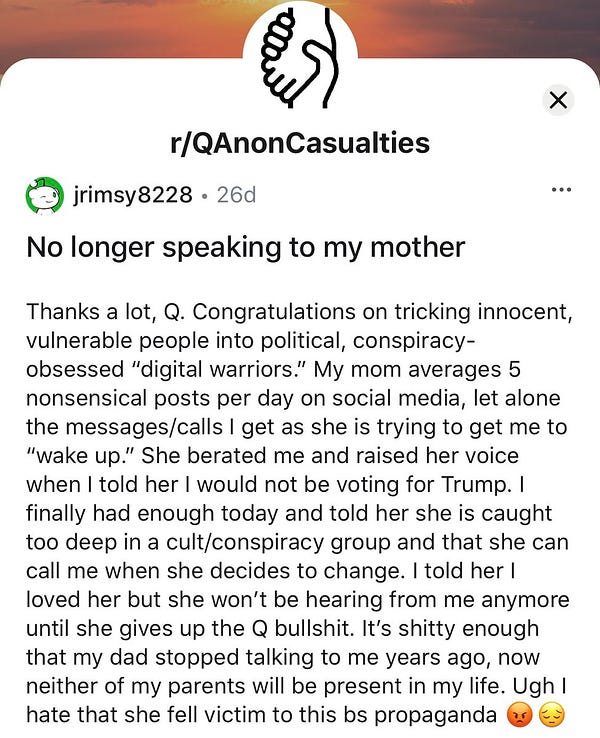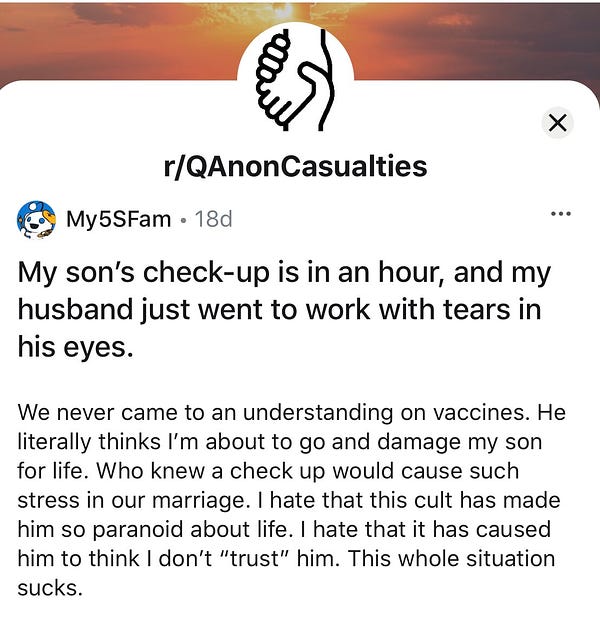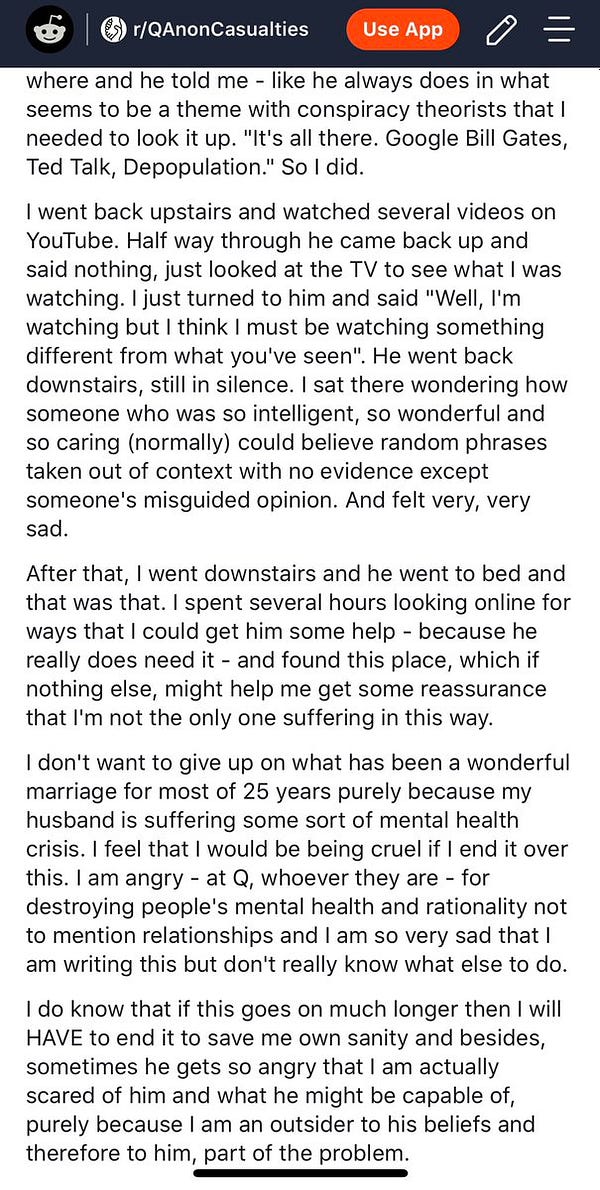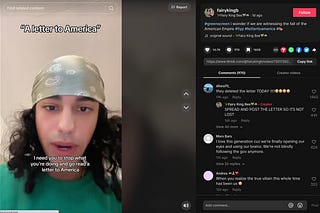

Discover more from Garbage Day
Meet The Doomsday Cult Researcher Ringing The Alarm On QAnon
"I just know a bad scene when I see it, I guess."
Welcome to the first Extra Garbage Day! Every other week, I’ll be dropping a bonus Thursday issue just for paying subscribers. To start, these will be Q&As with interesting people I’ve been dying to interview. Let me know what you think.
Meet Sarah H, she goes by @nezumi_ningen on Twitter, and I’ve been a huge fan of her work for a while now. Her main focus is Japan’s Aum Shinrikyo doomsday cult. Her tweets are this really insightful and esoteric mix of recent Japanese history and modern online extremism analysis.
If you’re not familiar with Aum Shinrikyo (I wasn’t until I started following Sarah), they’re a Japanese cult that was founded in 1984 by a man named Shoko Asahara. The cult’s probably best known for orchestrating the 1994 sarin attack on the Tokyo subway that killed 13 people and injured almost 1000 more.
Sarah’s tweets — drawing links between a lesser-known cult (for Americans) and current far-right phenomena like the incel movement and QAnon — were a dizzying experience for me when I first started following her. But I think she’s one of the people online who truly understands this current moment better than anyone else.


I interviewed Sarah last week, but our conversation feels weirdly in line with this week’s jaw-dropping report by NBC News’ Ari Sen and Brandy Zadrozny that QAnon Facebook groups have millions of members and that the platform has been aware of this fact since at least June.
2020 truly feels like the summer of Q. If that freaks you out and, like me, you’re comforted by placing the off-the-rails insanity of the present into the warm arms of historical context, check out this interview with Sarah on where she thinks this big mess is headed.
So, your main focus is the Aum Shinrikyo doomsday cult. Can you tell me about how you started researching them?
9/11, actually. I was pretty young back then, but I knew terrorism wasn't unique to any one culture, religion, ideology, etc. When you hear something like, "Well, you don't see any Buddhist terrorists, do you," and you're aware of at least one example… I bought Destroying the World to Save It by Robert Jay Lifton which changed the way I saw the world and I stuck with the subject as best I could because I cared.
I initially came across your account because of your tweets about American far-right groups like QAnon. Can you talk a little bit about what you think is similar to the conspiracy theorists/cult-like groups we have in the US versus something like Aum Shinrikyo? Are they even similar?
There are multiple similarities. A physical cult compound isn't necessary for a group to be what we might call "high demand" or "cultic." Even just a single individual can have a sort of "cultic experience" with any ideology or narrative. Lifton actually used that term to describe Oklahoma City bomber Timothy McVeigh's obsessive relationship with the dystopian narrative of The Turner Diaries. I suppose these days people are more inclined to describe this sort of experience as a process of radicalization. But even with this comparison, "self-radicalization" is still considered a valid concept.
When looking at groups and group dynamics specifically, it's helpful to look at what Lifton termed "Ideological Totalism" in his book Thought Reform and The Psychology of Totalism. Basically, he lays out a set of criteria which include things like:
Milieu Control — which we see in the rabbit hole of constant "research" and the alternate information ecosystem Q followers are kept in.
Mystical Manipulation — where the world of these high level military intelligence op "patriots" have been "awakened" is presented as an absolute struggle of good versus evil where "disinfo" on the part of Q is often "necessary".
Demand for Purity — intentionally ratcheting up the tension and raising the stakes so that any second guessing is a moral failing on part of the follower which the group then uses to reinforce hatred and fear before ultimately "forgiving" the follower and reminding of their special place in the group and group's narrative.
Cult of Confession — which we see as an extension of purity tests in which followers will often posit their doubts and frustrations as a direct plea to Q, the Q Team, or Trump himself.
The Sacred Science — followers aren't just special warriors of light and truth or patriots. They'll need to help explain things to their loved ones once the arrests, tribunals, mass executions, etc., happen because their loved ones won't be able to even process what's happening… so these followers with a unique understanding of the true nature of the world serve at least one noble purpose.
Loaded Language — this is a way of describing cult jargon like "where we go one we go all," "fake news," and "nobody can stop what's coming," which function as thought terminating cliches a follower is taught to use instead of thinking critically or listening to outsiders.
Doctrine Over Person — this is pretty self explanatory, but it's also very much evident in sayings like the aforementioned "where we go one we go all”.
Dispensing of Existence — and this is the part where the lines between in-group and out-group become so selectively and severely reinforced that the group easily can and will label anyone they see as threatening its doctrine or mission an enemy who will ultimately befall a terrible fate the group's belief system says is deserved.
Are there things that the US could learn from how Japan and its media either did or didn't deal with Aum Shinrikyo correctly?
Absolutely. Here's one example: When Asahara and Aum members ran for [seats in Japan’s House of Representatives] in a general election, the media and public at large just mocked them because it was an absurd spectacle. By that point Aum was already responsible for multiple murders including one mass murder of an entire family. There were a few people like Shoko Egawa who obsessively tracked and reported on the cult and there were, of course, news pieces and articles on concerned family members who were losing their children to recruitment, but Asahara was also allowed to go on talk shows. Aum stuff was non-critically evaluated and validated by people like [Japanese comedian] Beat Takeshi. People like Travis View, Mike Rothschild, and even Ben Collins are sort of like the Egawas in this current situation with QAnon. People who have been at it for years are the ones with the best ideas of how to handle Q coverage, imo.
One of my favorite things about your tweets is that you post a lot about what I would call common misconceptions about how cults and extremist movements work. What do you think are some of the biggest ones people make?
Calling them idiots won't help anyone. Assuming and asserting they were already like that or had some moral failing beforehand is incorrect. It can be very hard for people to consider this given the reprehensible or even frightening things people in these milieus say and I'm not attempting to make excuses but it's imperative to take a more informed, comprehensive approach to these sorts of situations.
Why do you think QAnon-style movements are proliferating right now? I know there's a ton of different theories, but what do you think is really happening?
These are nervous times and I think we're all under the weight of living in what really does feel like a series of unprecedented situations. In some ways we are, but there's really nothing new under the sun. That being said, there's no shortage of people out there with true faith and what they only think are good intentions. Some even unabashedly have bad intentions. Same as it ever was.
You've tweeted a bunch about how QAnon wasn't taken seriously at first. I'll even admit, when it first appeared, I didn't take it particularly seriously. And I'm still on the fence about its overall impact compared to something like the Men's Rights/incel movement. So I guess, what were you noticing back then that everyone was missing?
I just know a bad scene when I see it, I guess. I saw it changing people in real life as far back as 2018 and noticed that in the most severe case I was asked to help with, the people who changed weren't even what you'd call right wingers.
Where do you think all of this *waves arms around* is going?
I don't feel comfortable speculating at this time or even just in general. But it definitely ain't the end of the world. I feel comfortable saying that much.
And lastly, you tweet a lot about survivors and people coming out of cults. What do you think is the best first step for dealing with someone you know who starts sharing conspiracy theory garbage?
Anchor strategy. Keep them talking. Be kind to them and be kind to yourself. Keep tabs on their perception of reality through patient exchanges and conversations. Find a support group for yourself at the very least. Make sure to remind yourself that it isn't your fault, that help *is* out there, and that people manage to exit cults and bad situations every single day. You just don't see those stories as much... but it definitely happens.
I hope you found this as interesting as I did. Thank you all for subscribing. It really means a lot. By the way, if you know someone who should read this, don’t hesitate to fwd this along!
And here’s one more tweet for you:
***Typos in this email aren’t on purpose, but sometimes they happen***
Subscribe to Garbage Day
A newsletter about having fun online.














Great stuff Ryan!
Thank you for this interview! All I knew about Aum Shinrikyo was the subway attack, would never have known all this other stuff. Fascinating!